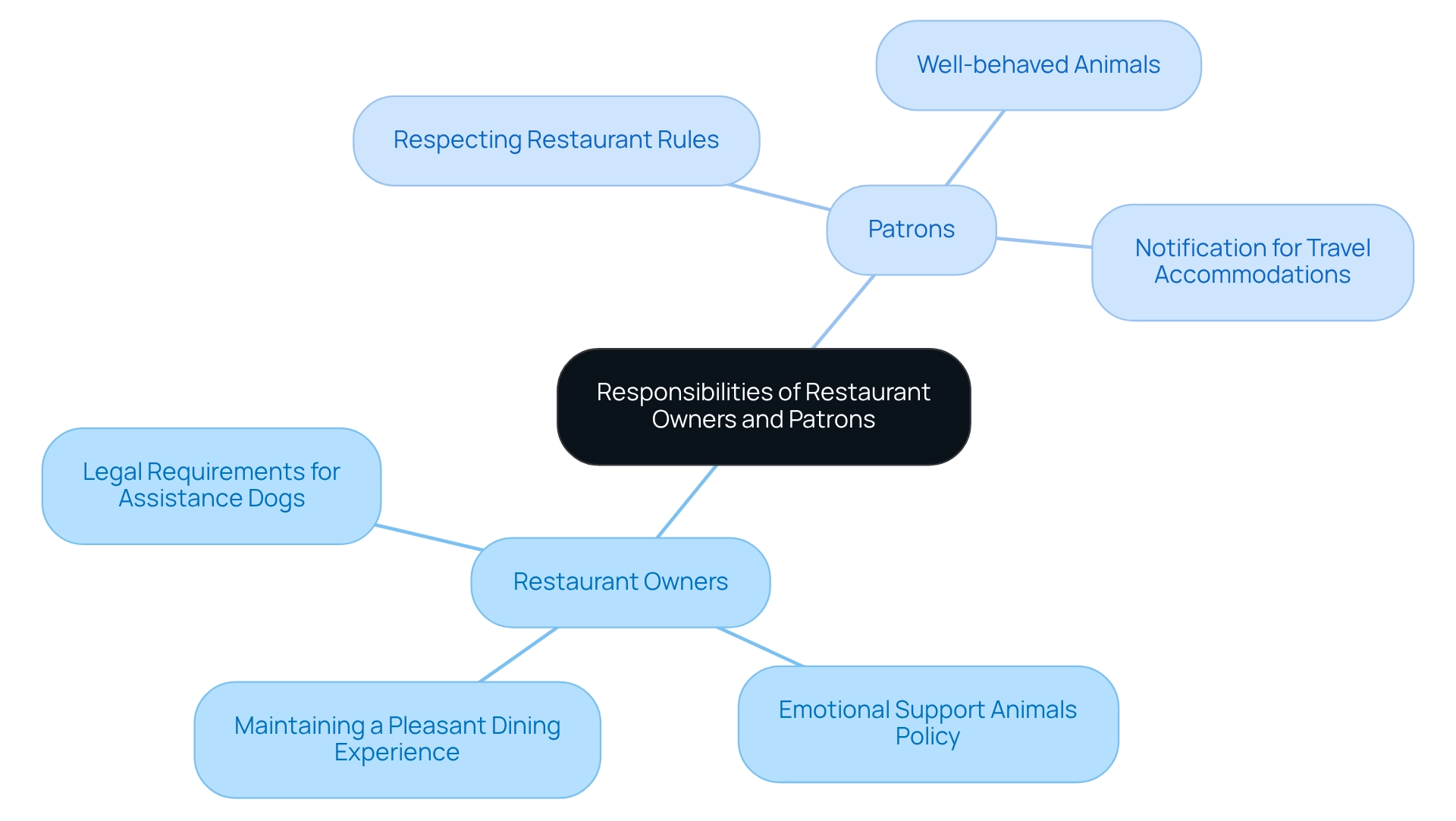

Are Emotional Support Animals Allowed in Restaurants? Key Comparisons
by Lena Park
Last updated: June 27, 2025
Verified and Approved by:
Angela Morris,
MSW, LCSW
Fact Checked

Overview
Emotional support animals (ESAs) play a vital role in the lives of many individuals facing mental health challenges. However, it’s important to understand that under the Americans with Disabilities Act (ADA), ESAs do not have the same legal access rights as trained service animals. This means that while service animals are recognized and must be allowed in public spaces, including restaurants, the entry of ESAs is left to the discretion of individual establishments. This can be disheartening for those who rely on the companionship and comfort that an ESA provides.
For many, the presence of an ESA can significantly alleviate feelings of anxiety, depression, and loneliness. They offer emotional support and companionship, which can be incredibly beneficial in navigating daily life. If you find yourself feeling overwhelmed by these challenges, consider the possibility of obtaining an ESA letter. This letter can help clarify the importance of your emotional support animal and may open doors to more supportive environments. Remember, you are not alone in your journey, and there are resources available to help you find the comfort and support you deserve.
Introduction
Navigating the world of assistance animals can indeed be a complex journey, especially when it comes to grasping the distinct roles of Emotional Support Animals (ESAs) and Service Animals. Both types of animals offer crucial support for individuals facing mental health challenges, yet their legal rights and access to public spaces, like restaurants, differ significantly.
As the demand for these animals continues to grow, it becomes vital to clarify their unique contributions and the responsibilities that both restaurant owners and patrons hold. This article aims to illuminate the definitions, legal frameworks, and practical considerations surrounding ESAs and service dogs, shedding light on the benefits and limitations each type presents in dining environments.
By understanding these distinctions, we can foster a more compassionate approach to the needs of individuals who rely on these beloved companions.
Define Emotional Support Animals and Service Animals
Emotional Support Animals (ESAs) are beloved pets that provide comfort and emotional assistance to individuals grappling with mental health challenges, such as anxiety, depression, or PTSD. Unlike service animals, ESAs do not require specialized training to perform specific tasks related to a disability; their primary role is to offer companionship and therapeutic benefits to their owners.
On the other hand, service animals are specifically trained to assist individuals with disabilities by performing tasks that help alleviate their limitations. According to the Americans with Disabilities Act (ADA), only dogs (and, in some cases, miniature horses) qualify as service animals. These remarkable beings are taught to perform essential functions, such as aiding individuals with visual impairments, alerting those with hearing difficulties, or providing support during medical emergencies.
It is crucial to understand the distinction between emotional support animals and service animals, particularly when discussing whether emotional support animals are allowed in restaurants, as this directly impacts their access rights in public spaces. Service dog owners enjoy full public access rights as protected by the ADA, allowing them to bring their service dogs into various public places, such as restaurants, stores, libraries, and public transportation. In contrast, emotional support animals do not have the same legal access rights, which raises the question of whether emotional support animals are allowed in restaurants, potentially leading to misunderstandings in community settings.
The growing reliance on emotional support animals and service dogs highlights their vital role in mental health care, with research indicating that these companions significantly help alleviate anxiety and support individuals with PTSD. As the demand for these animals continues to increase, especially in urban environments, it is essential to recognize the unique contributions of both ESAs and service animals in fostering mental well-being.
At Wellness Wag, we are dedicated to empowering individuals by providing accessible ESA letters, ensuring that everyone can experience the transformative companionship of these extraordinary beings. Moreover, understanding the eligibility criteria for obtaining an ESA letter through Wellness Wag can further enhance the support individuals receive on their journey toward improved mental health.
Examine Legal Rights and Regulations in Restaurants
In the United States, the legal rights of emotional support animals (ESAs) and assistance animals are significantly distinct, and this can be a source of confusion and frustration for many individuals. According to the Americans with Disabilities Act (ADA), assistance animals, specifically trained to help people with disabilities, are permitted entry to all public locations, including restaurants. This means that establishments must allow service dogs to accompany their handlers in any area accessible to the public.
However, emotional support animals do not enjoy the same legal protections. They are not recognized under the ADA, which means that restaurants are not required to permit emotional support animals on their premises. While some establishments may choose to adopt pet-friendly policies and allow emotional support animals, this decision is entirely at their discretion. This distinction is crucial for patrons wishing to know whether emotional support animals are allowed in restaurants, as it’s important to understand that access is not guaranteed. Many restaurants remain unaware of the nuances surrounding ESA policies, leading to inconsistent practices across the industry. For instance, in Wisconsin, private, nonprofit clubs that cater exclusively to members and invited guests are not included under state animal laws, complicating the situation for ESA access.
Understanding these regulations is vital for individuals who want to navigate dining experiences and determine if emotional support animals are allowed in restaurants with their emotional support animals. To ease this process, Wellness Wag offers a compassionate solution by providing valid ESA letters, ensuring rapid delivery within 24 hours of approval. Upon placing an order, customers receive a confirmation email detailing their purchase, which is essential for tracking their request. Although there is no legal obligation for assistance dogs to be certified or registered, obtaining certification from recognized organizations can lend credibility and clarity to the rights of assistance dog owners. This thorough understanding of rules and provisions is crucial for individuals managing dining experiences with their emotional support companions, allowing them to feel more secure and supported.
Discuss Responsibilities of Restaurant Owners and Patrons
Restaurant proprietors hold significant responsibilities when it comes to accommodating assistance creatures. They are legally required to welcome assistance dogs in their establishments, and they cannot ask for proof of the dog’s training or the handler’s disability. However, they may ask whether the dog is a support creature and what specific tasks it has been trained to perform. This ensures that the rights of individuals relying on service animals are upheld while maintaining a pleasant dining experience for everyone, but are emotional support animals allowed in restaurants? Owners are not required to permit emotional support animals, which leads to the question: are emotional support animals allowed in restaurants, or can they enforce a ‘no pets’ policy if they choose? Patrons with ESAs should be mindful of this and respect the restaurant’s rules about whether emotional support animals are allowed in restaurants. It’s also crucial for guests to ensure that their assistance creatures are well-behaved and do not disrupt the dining experience for others. This mutual understanding fosters a positive atmosphere in restaurants, allowing all guests to enjoy their meals comfortably.
For travelers accompanied by psychiatric assistance dogs, it is essential to notify the Air Canada Medical Assistance Desk at least 48 hours before departure to request any necessary accommodations, such as extra floor space for the dog. This proactive approach ensures that both the needs of the assistance animal and the patrons are respected during travel. It further underscores the importance of understanding the roles of support creatures in enhancing mental well-being and accessibility in various environments.

Compare Benefits and Limitations of Each Animal Type in Dining
The primary benefit of assistance creatures in dining settings lies in their legal right to accompany their handlers, providing essential support for individuals with disabilities. Service dogs undergo specialized training to perform specific tasks that can significantly enhance their owners’ dining experiences, such as guiding them to their table or alerting them to important sounds. This legal framework ensures that assistance creatures can offer vital help in public spaces, including restaurants.
On the other hand, emotional support animals (ESAs) offer companionship and comfort, which can be incredibly beneficial for individuals grappling with anxiety or stress in social situations. However, the lack of legal protections for ESAs means that the question of whether emotional support animals are allowed in restaurants remains unresolved, limiting their ability to assist in these environments. While emotional support animals are allowed in restaurants, they can help alleviate emotional distress without having the same training or public access rights as assistance creatures, which can lead to frustration for their owners when dining out. Research indicates that emotional support animals do not have the same legal standing as guide dogs, impacting their owners’ dining experiences. For instance, while assistance animals are recognized under the Americans with Disabilities Act (ADA), challenges arise in public venues regarding whether emotional support animals are allowed in restaurants, as they do not enjoy the same access rights. Furthermore, recent case studies highlight that although assistance animals in training may be permitted in certain public areas under specific state laws, emotional support animals do not benefit from such provisions. This legal distinction underscores the importance of understanding the rights associated with each type of animal.
In conclusion, while both service animals and emotional support animals provide significant emotional benefits, the legal limitations surrounding ESAs can hinder their effectiveness in dining settings, contrasting sharply with the rights afforded to service animals. For those contemplating obtaining an ESA letter, Wellness Wag offers flexible payment plans starting as low as $32.25, making the process more accessible for individuals seeking emotional support. Remember, you are not alone in this journey, and there are supportive options available to help you feel more at ease in social situations.
Conclusion
Understanding the differences between Emotional Support Animals (ESAs) and Service Animals is crucial for navigating public spaces, particularly restaurants. Many individuals face emotional challenges that can be overwhelming, and having an ESA can provide much-needed comfort. However, it’s essential to recognize that while ESAs offer emotional support, they do not have the same legal protections as service animals, which are specifically trained to assist individuals with disabilities. This distinction not only influences access rights but also impacts the experiences of both restaurant owners and patrons.
Restaurant owners are legally obligated to welcome service animals, which can enhance the dining experience through their trained assistance. However, they have the discretion to set policies regarding ESAs, leading to varying experiences for individuals seeking to dine with their support animals. This can create feelings of frustration and confusion for those who rely on ESAs for emotional comfort in social settings.
The growing demand for both types of assistance animals highlights the importance of awareness and understanding. As society becomes more attuned to the needs of individuals facing mental health challenges, fostering compassion and clarity around the roles of ESAs and service animals can significantly improve dining experiences for all. By acknowledging these distinctions, patrons can navigate their dining choices more effectively, while restaurant owners can create inclusive environments that respect the rights of service animal handlers.
Ultimately, a clear understanding of these roles contributes to a more empathetic approach toward the needs of those who rely on these remarkable companions. As we move forward, let us embrace the opportunity to support one another, ensuring that everyone feels valued and understood in their journeys.
Frequently Asked Questions
What are Emotional Support Animals (ESAs)?
Emotional Support Animals (ESAs) are pets that provide comfort and emotional assistance to individuals dealing with mental health challenges, such as anxiety, depression, or PTSD. Their primary role is to offer companionship and therapeutic benefits, and they do not require specialized training.
How do service animals differ from Emotional Support Animals?
Service animals are specifically trained to assist individuals with disabilities by performing tasks that alleviate their limitations. According to the Americans with Disabilities Act (ADA), only dogs (and, in some cases, miniature horses) qualify as service animals, which can perform essential functions such as aiding individuals with visual impairments or alerting those with hearing difficulties.
What are the public access rights for service animals?
Service dog owners enjoy full public access rights as protected by the ADA, allowing them to bring their service dogs into various public places, including restaurants, stores, libraries, and public transportation.
Are Emotional Support Animals allowed in restaurants?
Emotional Support Animals do not have the same legal access rights as service animals, which means they may not be allowed in restaurants and other public spaces, potentially leading to misunderstandings in community settings.
What role do Emotional Support Animals and service dogs play in mental health care?
Both Emotional Support Animals and service dogs play a vital role in mental health care, significantly helping to alleviate anxiety and support individuals with PTSD. Their demand is increasing, especially in urban environments.
How can individuals obtain an ESA letter through Wellness Wag?
Wellness Wag provides accessible ESA letters to empower individuals, ensuring they can experience the companionship of Emotional Support Animals. Understanding the eligibility criteria for obtaining an ESA letter can further enhance the support individuals receive for improved mental health.
Certify Your Emotional Support Animal Today

Why You Can Rely on Us?
At Wellness Wag, we believe your pet deserves care rooted in both science and compassion. Each article is carefully researched, written in clear language for pet owners, and then reviewed by qualified professionals to ensure the information is evidence-based, current, and practical for real-life care. Our goal is to help you feel confident in making informed decisions about your pet’s health and well-being.
Reviewed by
Angela Morris, MSW, LCSW
Angela is a licensed clinical social worker with 20 years of experience in patient advocacy and community mental health. She has assisted numerous clients with ESA evaluations and brings a deep understanding of disability accommodations, ensuring that all information is accurate, supportive, and practical.

Written by :
Lena Park
Last Updated :
June 27, 2025












